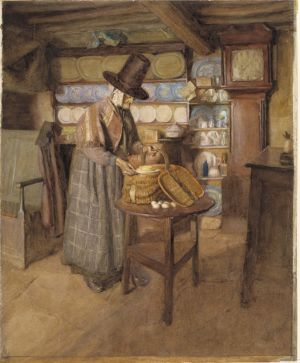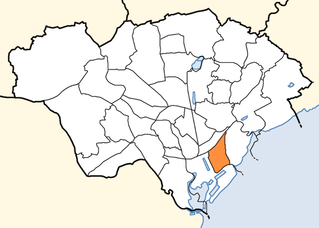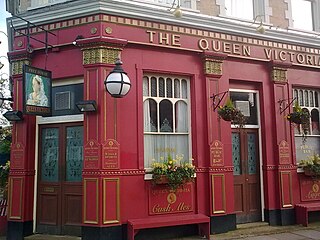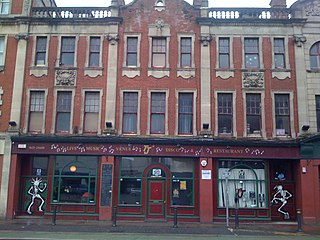
Cardiff is the capital and largest city of Wales. Cardiff had a population of 372,089 in 2022 and forms a principal area officially known as the City and County of Cardiff. The city is the eleventh largest in the United Kingdom. Located in the southeast of Wales and in the Cardiff Capital Region, Cardiff is the county town of the historic county of Glamorgan and in 1974–1996 of South Glamorgan. It belongs to the Eurocities network of the largest European cities. A small town until the early 19th century, its prominence as a port for coal when mining began in the region helped its expansion. In 1905, it was ranked as a city and in 1955 proclaimed capital of Wales. Cardiff Built-up Area covers a larger area outside the county boundary, including the towns of Dinas Powys and Penarth.

Dame Shirley Veronica Bassey is a Welsh singer. Known for her career longevity, powerful voice and recording the theme songs to three James Bond films, the only artist to perform more than one, Bassey is one of the most popular vocalists in Britain.

Welsh writing in English, is a term used to describe works written in the English language by Welsh writers.

The culture of Wales is distinct, with its own language, customs, festivals, music, art, mythology, history, and politics. Wales is primarily represented by the symbol of the red Welsh Dragon, but other national emblems include the leek and the daffodil.

Tiger Bay was the local name for an area of Cardiff which covered Butetown and Cardiff Docks. Following the building of the Cardiff Barrage, which dams the tidal rivers, Ely and Taff, to create a body of water, it is referred to as Cardiff Bay. Tiger Bay is Wales’ oldest multi-ethnic community, with sailors and workers from over 50 countries settling there from the mid-19th century onwards.

Splott is a district and community in the south of the city of Cardiff, capital of Wales, just east of the city centre. It was built up in the late 19th century on the land of two farms of the same name: Upper Splott and Lower Splott Farms. Splott is characterised by its once vast steelworks and rows of tightly knit terraced houses. The suburb of Splott falls into the Splott electoral ward.

The Queen Victoria is the Victorian public house in the BBC soap opera, EastEnders. It has the fictional address of 46 Albert Square, Walford, London E20.

TJ's was a music venue and nightclub located on Clarence Place in Newport, South Wales. It opened in 1985 and shortly became a live music venue.

Jim Burns is a Welsh artist born in Cardiff, Wales. He has been called one of the Grand Masters of the science fiction art world.

Clwb Ifor Bach is a Cardiff nightclub, music venue, Welsh-language club and community centre. It is known to the Cardiff Welsh-speaking community as Clwb and is often known by others on the Cardiff music scene as The Welsh Club.
This article is about the particular significance of the year 1944 to Wales and its people.
This article is about the particular significance of the year 1924 to Wales and its people.
This article is about the particular significance of the year 1900 to Wales and its people.

The timeline of Cardiff history shows the significant events in the history of Cardiff which transformed it from a small Roman fort into the modern capital city of Wales.

Cardiff has many cultural sites varying from the historical Cardiff Castle and out of town Castell Coch to the more modern Wales Millennium Centre and Cardiff Bay. Cardiff was a finalist in the European Capital of Culture 2008.

Lynette Deborah White was murdered on 14 February 1988 in Cardiff, Wales. South Wales Police issued a photofit image of a bloodstained, white male seen in the vicinity at the time of the murder but were unable to trace the man. In November 1988, the police charged five men with White's murder, although none of the scientific evidence discovered at the crime scene could be linked to them. In November 1990, following what was then the longest murder trial in British history, three of the men were found guilty and sentenced to life imprisonment.

The Gold Medal of the National Eisteddfod of Wales is awarded annually in three categories for excellence in Fine Art, Architecture, or Craft and Design.
Curran Steels was a manufacturing company in Cardiff, Wales, founded as the Edward Curran Engineering Co and known locally as Curran's.

The Newport music scene, in and around Wales' third city, has been well documented and acclaimed for cultivating bands, singers, and famous music venues. Newport has been traditionally a rock city since the 1970s, but it has evolved over the years to include forms of punk, 1990s alt-rock, and more recently metal and hip-hop.













